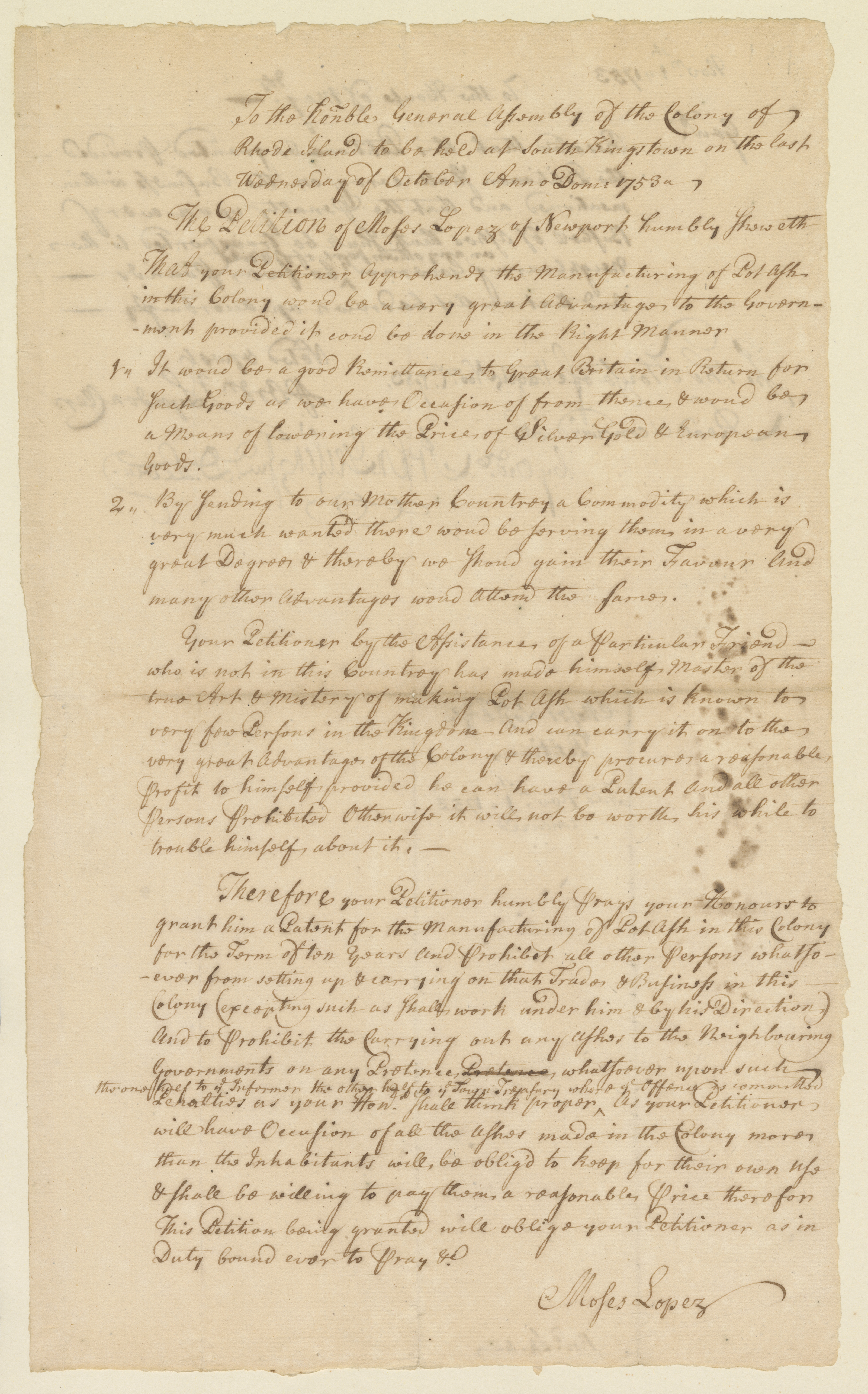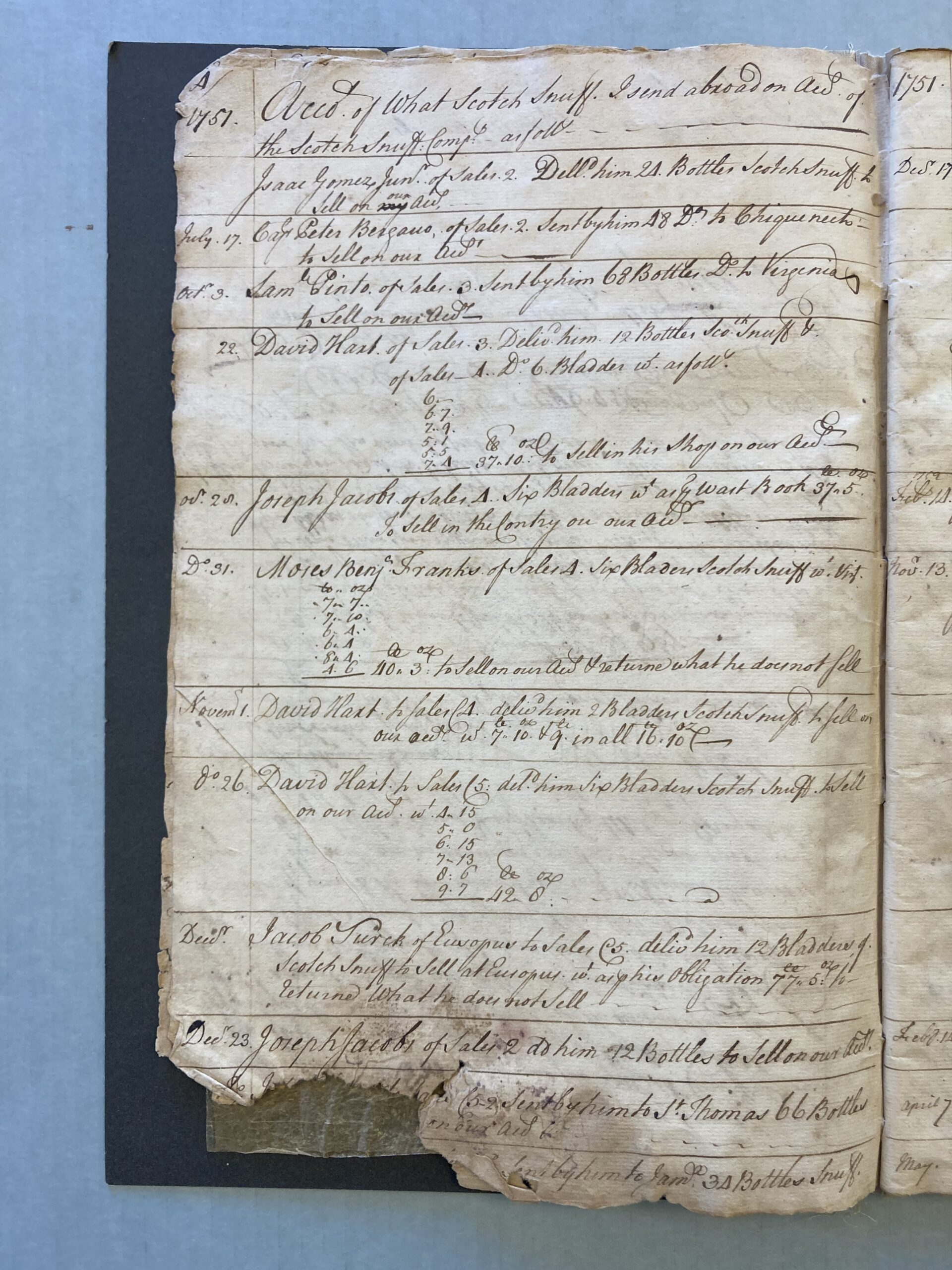Moses Lopez, Manufacturer
*
By Dr. Holly Snyder, Ph.D.

Born in Portugal in 1706, Moses Lopez was part of a large and wealthy family. When he was just 17, he faced scrutiny from the Inquisition for practicing Judaism and fled to London, where he could live openly as a Jew without fear of persecution. There he joined the household of an uncle, Abraham Rodriguez Rivera, and two years later the entire family migrated to New York. It was a close family, and Moses formed strong bonds with his cousins Jacob Rivera, who soon became his business partner, and Rebecca Rivera, whom he married.
In the 1740s, Jacob and Moses were attracted to Newport, Rhode Island because its trade was growing, and they saw opportunity in producing products to sell. They joined forces with a third man, Aaron Nunes Cardoso, to form a company for the manufacture of Scotch snuff, a form of refined tobacco that was popular among men in the 1700s. Aaron moved to Newport to manage the snuff mill, while Jacob and Moses worked from New York to test flavors and market bottles of finished snuff. 1 ‘A working snuff mill from the 1700s can be seen at the Gilbert Stuart Birthplace & Museum in Saunderstown, Rhode Island Though the company only lasted a few years, its success encouraged Moses to pursue other types of manufacturing in Newport. By 1750, Moses had moved his family to Newport and was experimenting with making candles from tallow and whale oil. But candle making was a larger challenge than snuff because the manufacturing process needed more space and the tallow and whale oil had to be heated in order to make the candles. For this project, Lopez required an investor. He sought help from John Bannister, a Boston merchant.
Bannister’s ledger shows that the Lopez & Rivera candle business was successful, as it provided Bannister with a good return on his investment and substantial profits.. Its success also supplied Moses with an idea for a side business to produce potash, a refined substance instrumental for the manufacture of candles, but also useful in the making of other necessities of the day, especially soap and glass. With hopes to pursue this business, Moses submitted a petition to the General Assembly of Rhode Island. In order to suppress competition from nearby colonies, he asked the Assembly to award him a 10-year monopoly which would give him the right to be the sole producer of potash in Rhode Island. Whether he was able to take advantage of the monopoly granted him by the Assembly is unknown.
Moses continued his work in the candle manufactory to the end of his life. Since this business supported his entire extended family network, he continually sought improvements to his manufacturing process in order to keep his existing customers satisfied and attract new ones.
He also put his business skills to work on behalf of Newport’s Jewish community when they decided to build a synagogue, serving as Parnass (president) of the congregation while the synagogue was under construction in 1762, and participating in its dedication the following year. He died suddenly in 1767, aged 61.
Terms:
Inquisition: a judicial process and later an institution created by the Catholic Church and the pope to combat heresy, or any religious belief that did not align with Catholic beliefs. In Portugal the Inquisition was established in 1536 and existed until 1821.
Resources:
NOTE: There are no known portraits of Moses Lopez
Holly Snyder, “English Markets, Jewish Merchants and Atlantic Endeavors: Jews and the
Making of British Transatlantic Commercial Culture, 1650-1800,” in Richard L. Kagan and Philip D. Morgan, Atlantic Diasporas: Jews, Converos, and Crypto-Jews in the Age of Mercantilism, 1500-1800, pp. 50-74.
Letter of Moses Lopez to Joseph Simson and Samuel Judah, July 25, 1762. Digitized, and can be viewed online. Jacques Judah Lyons Collection (P-15), Box 3, Folder 182. Collections of the American Jewish Historical Society, Center for Jewish History.
- 1‘A working snuff mill from the 1700s can be seen at the Gilbert Stuart Birthplace & Museum in Saunderstown, Rhode Island

